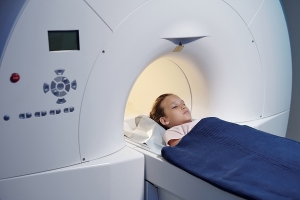by
John R. Fischer, Senior Reporter | November 23, 2023

Study says there is strong evidence to confirm the association between low-dose CT scan radiation and blood cancer development later in life.
Over the past decade, reports have indicated that radiation exposure among patients from CT scans has dropped significantly. Despite this, radiologists are still not sure of the exact risks that low doses of radiation pose to patients, including for the development of cancer.
But in a new study involving nearly one million patients, Spanish researchers at the Barcelona Institute for Global Health say that they now have evidence confirming a strong link between low-dose CT radiation and the development of blood cancers in young people.
While previous studies have also shown increased risks, their findings have been limited by deficiencies in trial design, implementation, and assessments, say the researchers. For their evaluation, they assessed records for 948,174 patients below the age of 22 from 276 hospitals in Belgium, Denmark, France, Germany, the Netherlands, Norway, Spain, Sweden, and the U.K. They compiled their findings as part of a European-funded study, EPI-CT, coordinated by the International Agency for Research on Cancer (IARC) to investigate the onset of health effects later in life from exposure to ionizing radiation from CT scans in childhood and adolescence.



Ad Statistics
Times Displayed: 174441
Times Visited: 3180 For those who need to move fast and expand clinical capabilities -- and would love new equipment -- the uCT 550 Advance offers a new fully configured 80-slice CT in up to 2 weeks with routine maintenance and parts and Software Upgrades for Life™ included.
According to them, while a dose of 100 mGy increases the risk by a factor of about three, a scan today with an average dose of about 8 mGy still makes the chances of developing blood cancer about 16% higher, meaning that out of every 10,000 children, about one to two cases of cancer can be expected within 12 years of the exam.
“Our findings highlight the need for raising awareness in the medical community and for continued strict application of radiological protection measures in medical settings through, and optimization of, radiological procedures, particularly in pediatric populations,” Elisabeth Cardis, head of the radiation group at ISGlobal and lead author of the study, told HCB News.
Little change in risk over time
For EPI-CT, researchers at Barcelona ISGlobal employed greater lags and extended exclusion periods to assess how risk estimates changed throughout time. They estimated doses delivered to the bone marrow in each person and looked at national cancer registries to see who developed cancer over time. On average, they tracked individuals for 7.8 years but were able to assess risks in those who received scans in the early days of CT for more than 20 years.
Because risk estimates remained elevated even during extended periods, and reverse causation and confounding factors such as birth cohort and socioeconomic status were found not to have altered associations, the researchers concurred that low-dose CT radiation likely puts patients at greater risk for hematological, lymphoid, and myeloid malignancies.

